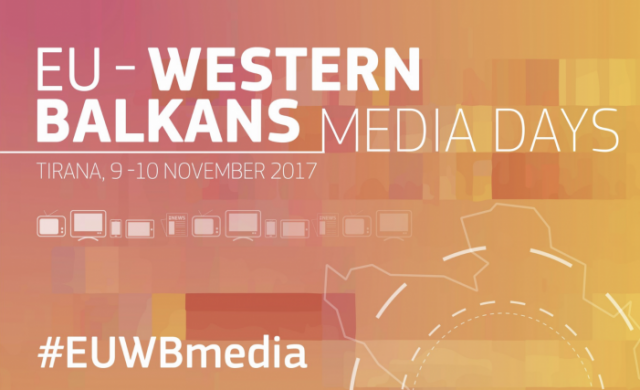
Tirana, 09.11.2017.-EU & Western Balkans Media Days in Tirana gathered politicians, activists and journalists at a two-day conference dedicated to the media.
A group of journalists from Serbia and the region asked for stronger support from the European Union and greater protection of journalists recently in the country, especially under pressure from the government for investigative stories. In a kind of protest, they stood up during a regional conference, “Western Balkans Media Days”, held in Tirana, wearing black t-shirts, which read: “It looks like there’s no free media” and “#StopMediaMacedonia”, as well as the inscription “#EUdoMore”.
Branko Čečen, director of the Center for Investigative Reporting of Serbia, said that the media in Serbia had already come to a desperate situation where independent and professional journalism was marginalized and then the authorities began to shake off certain local media. In agreement with the group “For Freedom of the Media” that was gathered earlier in Serbia, Chechen sought public support from the EU during a conference in Tirana.
“The EU can do much to help, that’s right, and I really expect the EU assistance, but when we tell them what that assistance should be, it would be very helpful for us to be aware of what the EU can do in the framework of its powers, if it comes to her, I expect Serbian journalists and citizens of Serbia to do it if they want independent journalism. ”
Zeljko Ivanovic, director of Montenegro’s Vijesti, said a that it was scandalous that Albanian Prime Minister Edi Rama spoke about media credibility at opening the conference in Tirana and compared him with other politicians from the region.
“It would be the same for you to have Vucic here, or to have Djukanovic here, or to have a Trump,” Ivanovic said, adding that editors such as his, or numerous colleagues in Albania, speak to the editorial meetings on the credibility of their sources three times a day, each day. Such a way of criticizing media is similar to those that contributed to the murder of a research journalist in Malta last month.
Brankica Petkovic from the Peace Institute from Slovenia added that freedom of media should be fought for instead of waiting for another murder.
A conference in Tirana, Western Balkans Media Days, gathered several hundred journalists, representatives of institutions, analysts, political and media activists and media experts, on a two-day set of panels and workshops dedicated to media freedom, new directions in the media, digitalization and new financing models, as well as the needs of journalists.
Johannes Hahn, EU Enlargement Commissioner, said at the opening that he hoped that the new conference, which represents the continuation of the three Speak Up conferences, will be more concrete and fruitful in terms of contributing to solving the problems that the media face. “There is no negotiation about media freedom,” Hahn said.